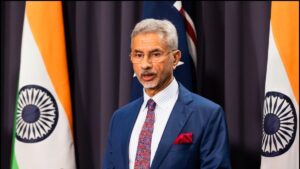Who is Justice Sanjiv Khanna? All About CJI Chandrachud’s Successor

Last Updated:
The 51st CJI would have a tenure of six months before he retires on May 13, 2025 as Supreme Court judges retire at the age of 65.
Outgoing Chief Justice of India (CJI) D.Y. Chandrachud with CJI-designate Justice Sanjiv Khanna during a farewell function. (PTI)
Justice Sanjiv Khanna is set to become 51st Chief Justice of India (CJI) who would be sworn in on Monday, November 11. The senior-most Supreme Court judge, Justice Khanna’s name was proposed by outgoing CJI Dhanajaya Yeshwant Chandrachud.
The 51st CJI would have a tenure of six months before he retires on May 13, 2025 as Supreme Court judges retire at the age of 65.
At present, he is the executive chairman of the National Legal Services Authority (NALSA) and a member of the governing council of the National Judicial Academy (NJA) in Bhopal.
At a farewell event for Justice Chandrachud, organised by the Supreme Court Bar Association (SCBA), Justice Khanna, in an emotional speech, said there would be an “emptiness” in the Supreme Court with his demitting office. While lauding his predecessor, Justice Khanna said that Justice Chandrachud worked on a mission to improve the apex court and pursued his goal of making it “a sanctuary of inclusivity”, which was accessible to all.
Who is Justice Khanna?
Justice Sanjiv Khanna was born on 14 May 1960 to late Justice Dev Raj Khanna, former Judge of Delhi High Court. He completed his schooling at Delhi’s Modern School, Barakhamba Road. He graduated from the University of Delhi in 1980 and later studied Law from the Campus Law Centre, University of Delhi.
Justice Sanjiv Khanna enrolled as an Advocate with the Bar Council of Delhi in 1983. He began his practice in the District Courts at Tis Hazari in Delhi and later in Delhi High Court. His area of practice was wide and varied from writ petitions in public law matters, direct tax appeals, income tax prosecutions, arbitration cases, commercial suits, environment and pollution laws matters, besides medical negligence cases before consumer forums and company law cases before the Company Law Board.
According to Supreme Court website, Justice Khanna was appointed as the standing counsel (civil) for the National Capital Territory (NCT) of Delhi in 2004. In the high court, he has appeared and argued in a number of criminal cases in the role of an additional public prosecutor and an amicus curiae.
In 2005, he was elevated as an additional judge of the Delhi HC and made permanent in 2006. As a judge in that high court, he has held the position of chairman/judge-in-charge of the Delhi Judicial Academy, Delhi International Arbitration Centre and the District Court Mediation Centres.
Justice Khanna is reportedly among the few judges elevated to the SC even before becoming a Chief Justice of any high court. He has been part of a number of important rulings as a judge of the top court.
Key Judgments Of Justice Sanjiv Khanna
During his tenure in the Supreme Court, Justice Sanjiv Khanna was a part of the Constitution Bench constituted for many important cases. He was part of the five-judge bench that declared the electoral bond scheme, meant for funding of political parties, as unconstitutional. He was also part of the five-judge bench that upheld the Centre’s 2019 decision abrogating Article 370 of the Constitution, which gave special status to the erstwhile state of Jammu and Kashmir.



